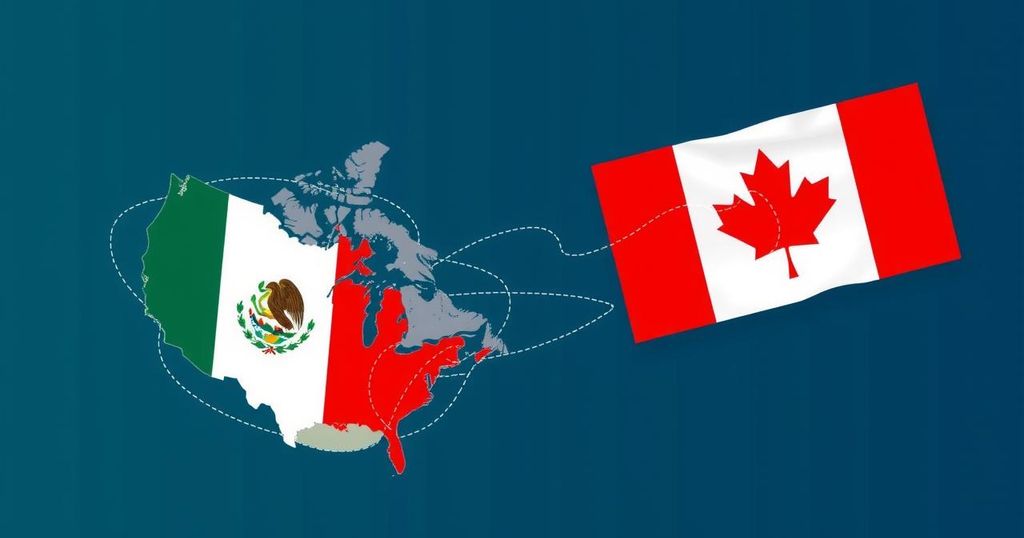Donald Trump’s potential trade war with Mexico, China, and Canada could significantly affect U.S. consumers, as these nations account for over 40% of U.S. imports. Proposed tariffs may push companies to relocate manufacturing, primarily to Vietnam, but existing contracts and price dynamics could hinder this shift. Analysis suggests that, despite tariffs, companies might choose to absorb costs rather than change manufacturing locations, keeping consumer prices under pressure.
President-elect Donald Trump has indicated his desire to initiate a trade conflict with the United States’ three principal trading partners: Mexico, China, and Canada. This potential trade war could have significant ramifications for consumers, as these three countries accounted for over 40% of U.S. imports last year. Should tariffs be implemented as proposed, companies may divert their production away from these countries, but it remains uncertain where they will relocate their manufacturing operations. Additionally, the higher tariffs could lead to increased consumer prices if domestic production does not significantly rise to compensate for these changes.
In a potential move to bolster domestic manufacturing, Trump has suggested additional tariffs, including a 10% tariff on Chinese imports and a substantial 25% tariff on goods coming from Mexico and Canada. While the aim is to motivate U.S. businesses to bring manufacturing back home, experts caution that this is unlikely to lead to a meaningful resurgence of domestic production. Economic analyst Daniel Anthony remarked that when tariffs were raised on Chinese goods during Trump’s administration, there was minimal production returning to the U.S. due to challenges such as inadequate infrastructure to support various manufacturing sectors.
Given the likelihood that businesses will seek alternative locations for manufacturing to evade steep tariffs, trade analysts anticipate Vietnam will emerge as a primary option, benefitting from low production costs. However, the rapid influx of companies might strain local resources and increase operational expenses. Other regions, such as Europe and Southeast Asia, may also see increased manufacturing activity in sectors such as automotive, apparel, and electronics. Countries such as Germany, Japan, and South Korea could fill gaps left by any decrease in imports from Mexico.
Despite these potential shifts, many companies face constraints such as existing contracts and a priority towards minimizing overall costs, which may lead them to absorb the tariffs rather than relocate. Historical data illustrates that, even with rising tariffs, U.S. imports from China remained substantial, highlighting the challenges of completely disengaging from established supply chains. Overall, while the proposed trade policies could alter the landscape of U.S. imports, numerous factors will ultimately dictate the effectiveness of such measures.
The article discusses the potential repercussions of President-elect Donald Trump’s intention to initiate a trade war involving tariffs against key trading partners: Mexico, China, and Canada. These countries represent a large proportion of U.S. imports, and Trump’s tariffs aim to encourage domestic manufacturing by increasing the costs of imported goods. However, experts have pointed out that such measures may not significantly increase domestic production due to existing infrastructure issues and the comparative advantages of continued foreign production. The implications of these tariffs could lead to higher consumer prices and a reevaluation of manufacturing strategies among U.S. businesses.
In conclusion, while President-elect Trump’s proposed tariffs are intended to stimulate U.S. manufacturing and reduce reliance on key trading partners, the actual impact remains uncertain. Companies may be inclined to look for alternative manufacturing locations such as Vietnam or European countries, but existing commitments and market dynamics may lead many to continue operations as they have. Economic analysts warn that tariffs could result in rising consumer prices without achieving substantial increases in domestic production.
Original Source: www.cnn.com






